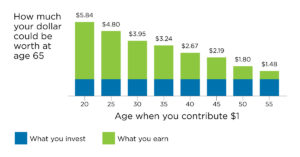Your Financial Health
Earlier this year I saw an article from CNBC highlighting that 60% of Americans would be pushed into debt by a $1,000 emergency expense. This is very alarming for our nation as a whole and may have very serious ramifications for our economy during the next economic downturn.
As a former student of finance, finance and economics have been a passion of mine since leaving the field and working in business. I thought this might be a good opportunity to share two concepts that I believe can make a huge difference at the individual level and very valuable the younger you are.
- Power of Daily Habits
- Power of Compound Interest
Power of Daily Habits
An ounce of prevention is worth a pound of cure – Ben Franklin
Similar to an individual seeking to start a new diet or exercise routine, results won’t be seen overnight, but if done with regularity, results can be dramatic over time. Financial health follows a similar blueprint to success.
Take this example of saving $10 per day. This $10 would add up to $3,650 per year. If kept up for five years, it would amount to $18,250 before any effects of compound interest that could be earned on that savings.
Becoming a net saver isn’t easy and requires tough trade off decisions and delayed gratification, the idea of putting off something mildly fun or pleasurable now, in order to gain something that is more fun later. However, if you’re able to start with some small simple changes and build up an emergency reserve fund or take advantage of a 401k match with your employer, you will actually be gaining more than $1 for each dollar saved.
Power of Compound Interest
Compound interest is the eighth wonder in the world. Those who understand it, earn it; those who don’t, pay it – Albert Einstein
When it comes to financial health, starting to save early in life has huge implications long term and it is due to the power of compound wealth. Take the following chart provided by Vanguard that shows the power of saving and investing $1 at various ages based on a 4% compound annual return.

One dollar invested at age 20, invested at 4% for 45 years will be worth nearly $6! Or the $3,650 saved from the first example, if at age 25 would grow to be worth $17,520 in this example. Saving combined with investing left to grow over time is as Einstein said, the eighth wonder of the world.
When we take on debt for purchases, we fall into the same situation, but in reverse. That isn’t to say that all debt is bad, however it is important to understand the interest rate we are being charged and the length of the loan to better understand the full cost of our purchase of a home, car or using our credit card for purchases.
In Closing:
These are concepts many of you probably are aware of and like health habits, simple in theory and more difficult in practice. However I hope that you find some value in these concepts and wish you the best in your pursuit of your own long term financial health.